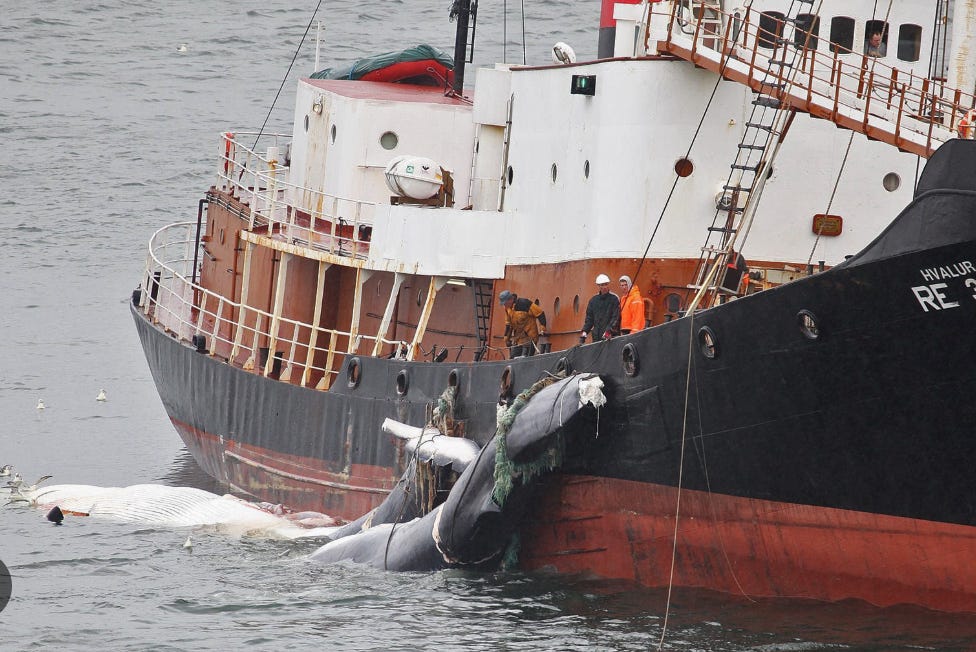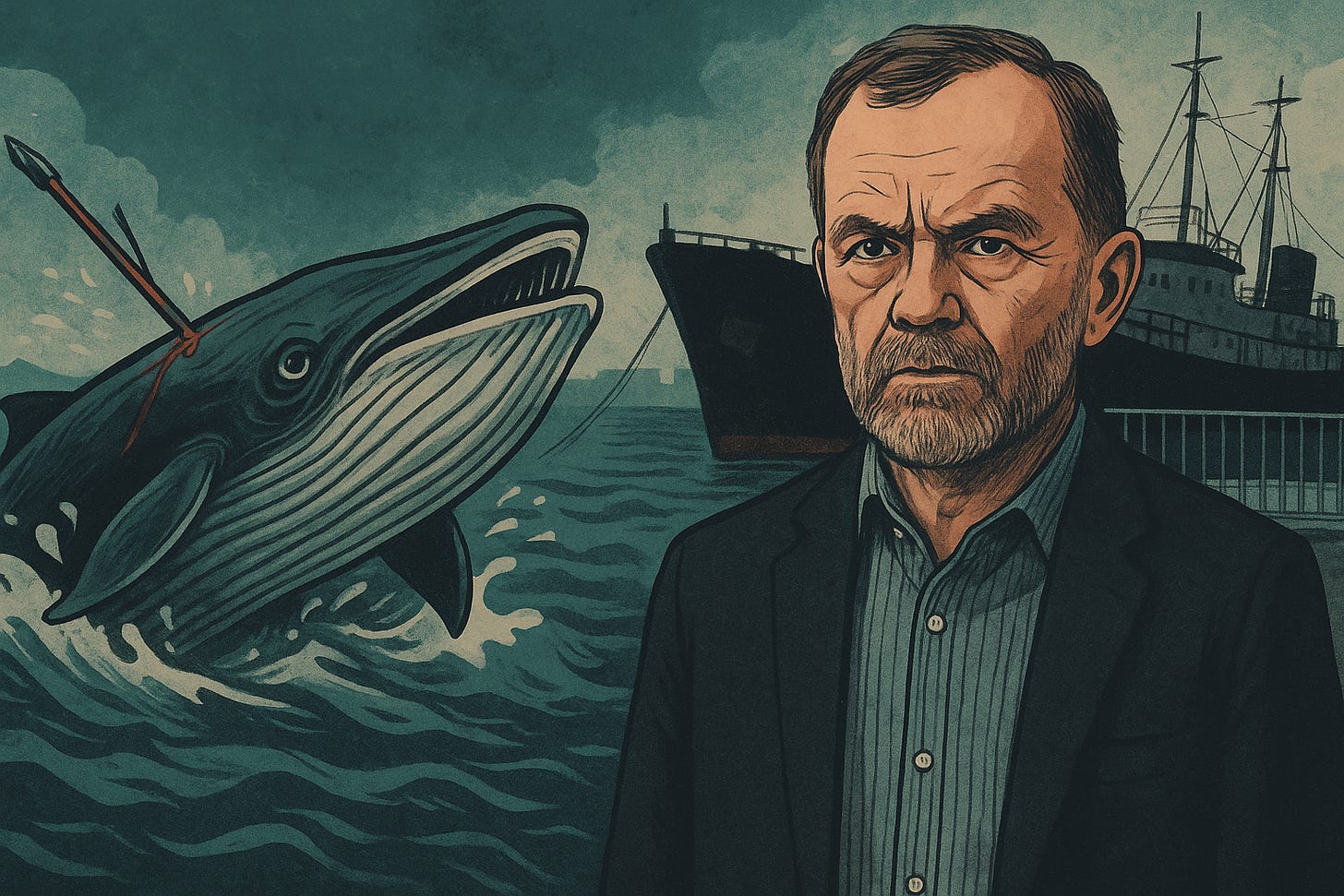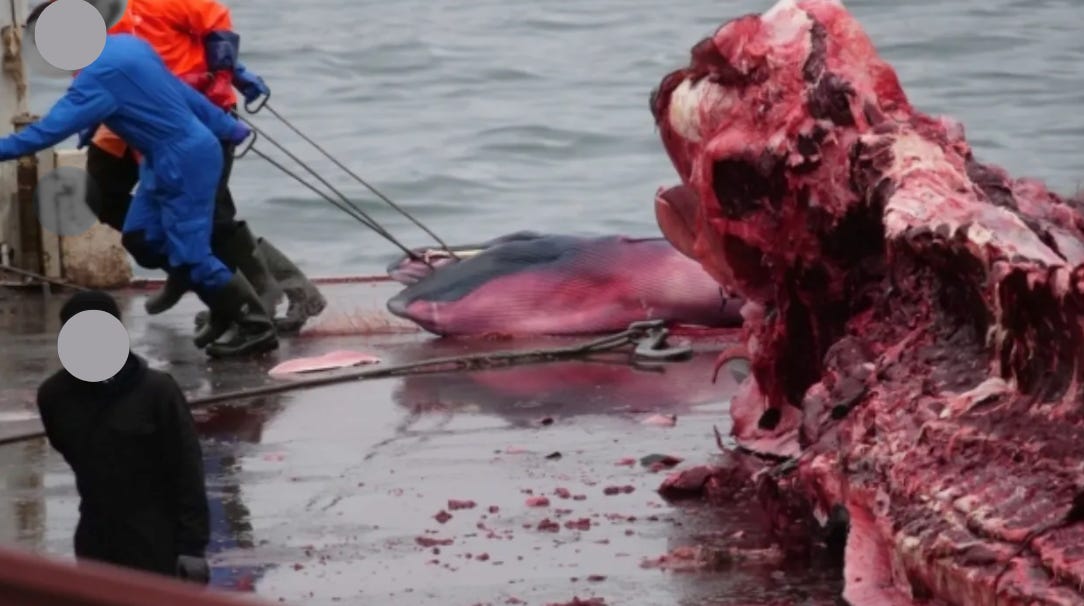Can the EU End Iceland’s Whaling Corruption?
The EU–Iceland ocean agreement collides with entrenched power and political favours
One fin whale took 35 minutes to die.
She thrashed. She dove. She surfaced. Then she disappeared into the deep, still dying. When her body was finally pulled in, it was clear she had been shot twice and suffered longer than any other whale in the 2023 Icelandic hunting season.
Meanwhile, Kristján Loftsson, billionaire CEO of Hvalur hf. and Europe’s last fin whaler, pens propaganda opinion pieces for the Icelandic press. He argues that rising whale numbers threaten fish stocks. He blames whales for failed fishing seasons, claiming their growing appetite disrupts the food chain. In his view, whales are a resource to be managed like any other. He says their deaths were necessary. In one piece, he argued that animal welfare laws should not apply to whales.
For Loftsson, whales are not sentient mammals. They are a source of power.
When Iceland’s then-Minister of Food, Svandís Svavarsdóttir, suspended the hunt in June 2023, I was in Reykjavík. I met with her. I shook her hand. I genuinely believed we had reached a turning point.
We had the evidence. We had the political will. We had a moment.
Yet weeks later, Hvalur hf. resumed the hunt. Twenty-four fin whales were killed. One was pregnant. Her unborn calf was dragged out of her womb with hooks. These are animals that are recognised as Vulnerable by the IUCN.
Now, for the first time, Loftsson may have met his match.
Hope on Paper
Last week, the European Union and Iceland signed a landmark Memorandum of Understanding (MoU) on ocean governance, sustainability and shared marine management. The document includes sections on climate, biodiversity, science-based fisheries and even mentions cetaceans directly.
It is a serious policy milestone. It signals international alignment on protecting the ocean. It is, by many measures, historic.
So there is hope among the conservation community. This MoU could be the moment commercial whaling finally ends in Iceland.
But.
We’ve been here before, and Loftsson has a habit of writing his own ending.
The Licence That Should Never Have Been Granted
On 5 December 2024, acting Prime Minister Bjarni Benediktsson issued a five-year commercial whaling licence to Kristján Loftsson’s company, Hvalur hf. It gave him permission to harpoon up to 209 fin whales annually, right through to 2029.

There was no public consultation. No parliamentary debate. No updated scientific review.
It was not a democratic decision. It was a political favour.
Just days earlier, Benediktsson’s coalition had lost its parliamentary majority. His administration was operating in caretaker mode, a period when major, long-term decisions are supposed to be avoided. Ministers are expected to maintain government functions, keep the status quo, not set national direction. Especially not on a deeply controversial issue that affects Iceland’s international standing and violates its own animal welfare laws.
Yet the licence was pushed through anyway.
Secret recordings later revealed why.
The tapes, obtained by a private intelligence firm and reported by Icelandic outlet Heimildin, captured a conversation between an undercover investigator posing as an investor and Gunnar Bergmann Jónsson, the son and business partner of MP Jón Gunnarsson. What they exposed was not bureaucracy. It was collusion.
In the recording, Gunnar describes a deliberate arrangement. His father, a long-time whaling supporter and close friend of Loftsson, had lost his seat in the recent 2024 election. To keep some level of power, he agreed to accept a position as “special assistant” within the Ministry responsible for whaling licences. His task? Ensure the licence was granted before a new anti-whaling coalition could form a government.
Gunnar put it plainly:
“We actually don’t care about anything else right now… This would be quite a good legacy to leave.”
He even floated the idea that his father could later join Hvalur hf. in a managerial role, saying:
“When my father retires… maybe Parliament will just make him the manager of the company.”
The entire operation was designed to fast-track the licence under the radar. The acting Prime Minister himself has family connections to Hvalur hf., and, according to the recordings, could not sign the licence directly without risking accusations of conflict of interest. Instead, the task would be passed to a colleague within the party.
Environmental groups called the move illegitimate, unethical and a deliberate circumvention of Icelandic democracy. Even Jane Goodall intervened, writing to the Prime Minister and President:
“Many of those not killed immediately suffer slow and agonising deaths… I beg that you will use your positions to help end whaling practices in Iceland.”
Still, the licence stands.
It was issued in a moment of political vulnerability, by an outgoing minister, via a backroom deal, facilitated by a man who had already lost the public’s vote. No independent review. No parliamentary approval. No accountability.
This was not oversight. It was orchestration.
This was not the will of the people. It was the will of a friend.
It is not just controversial. Many are calling it corruption.
The Science Is Clear
Kristján Loftsson insists that whales are eating too many fish and need to be culled. He portrays them as competitors, gluttons threatening fisheries by consuming vital stocks like capelin.
Marine scientists disagree. Emphatically.
Fin whales do not eat cod or haddock. They feed almost entirely on krill and small schooling fish, animals at the base of the food web, not the top. Far from destabilising ecosystems, their presence strengthens them.
Whales are not marine pests. They are planetary climate allies.
Each whale is a living carbon vault. Over their lifespans, they store tens of tonnes of CO₂, more than even the largest trees. When they die and sink to the ocean floor, that carbon is locked away for centuries in the deep sea. This process is known as a "whale fall", and it is one of the most efficient forms of natural carbon sequestration on Earth.
Their contribution doesn’t end with their deaths.
Through their feeding and defecation cycles, what scientists call the “whale pump”, they ferry essential nutrients like nitrogen, phosphorus, and iron from the deep ocean to surface waters. These nutrients fertilise phytoplankton, the microscopic plants that produce half the oxygen we breathe and absorb staggering amounts of carbon dioxide from the atmosphere.
Whales also transport nutrients from feeding grounds to breeding grounds, stimulating ocean productivity across vast distances, including in regions where nutrients are otherwise scarce. This movement, sometimes called the “whale conveyor belt” boosts carbon capture along their migratory routes.
In short. Whales help regulate the climate. They make oceans more productive. They trap carbon in ways no machine or model has yet replicated.
To kill them is not only cruel. It is scientifically incoherent. Environmentally self-defeating. Economically regressive, and morally absurd.
Whaling is not management. It is sabotage, of ecosystems, of climate stability, and of our ability to protect a livable future.
The System That Let It Happen
This is no longer just about one man.
It is about the system that enabled him, a system in which political access trumps public accountability, and inherited power still pulls the strings.
Loftsson’s influence runs deep. Ministers have familial or personal ties to his company. Hvalur hf. has lost money on whaling for years, yet the hunt continues, propped up by status, pride and stockpiles of frozen whale meat that no one is buying.
In 2023, 24 whales were killed. Nearly one in three were not killed instantly. Some took over 20 minutes to die. Several had to be pursued again after being struck. This was not an exception. It is a pattern. The previous year there were documented incidents in which whales hit with explosive harpoons took up to two hours to die, as well as the slaughter of pregnant and lactating females.
Iceland’s own Food and Veterinary Authority ruled the methods breached animal welfare law. Yet the hunt resumed anyway.
Whale watching is now worth more to Iceland than whaling ever was. The population is turning against it, recent polling showing the majority are now against whaling. International pressure is building.
The EU has leverage through trade and political cooperation. This MoU gives it the chance to apply real pressure, if it chooses to.
What You Can Do
Share the story. Most people don’t know what’s happening in Icelandic waters, or how close we are to stopping it. Use your voice to amplify the truth. Public pressure works.
Contact your EU representative. If you’re an EU citizen, urge your MEP to demand Iceland honours the spirit of the MoU. Remind them that ocean protection and commercial whaling cannot coexist.
Support the groups exposing this. Campaigners, whistleblowers, and investigators are underfunded and under fire. Back the organisations fighting for transparency, accountability, and whale protection. Check out WDC, AWI and the Last Whaling Station.
A Moment That Matters
The EU–Iceland MoU may not mention whaling directly, but its spirit is incompatible with it. A declaration rooted in sustainability, climate resilience and science-based marine protection cannot quietly coexist with the commercial killing of vulnerable cetaceans.
This could be a turning point. A reset. A chance to finally align Iceland’s domestic actions with its international commitments.
Yet the question remains.
Can a signed memorandum in Brussels override secret deals in Reykjavík? Can EU diplomacy undo decades of influence woven into ministries, party lists, and parliamentary friendships? Can conservation outmuscle corruption?
Ending commercial fin whaling would not be symbolic. It would be seismic. It would show that declarations of stewardship mean something. It would prove that the world’s last fin whale slaughterhouse can no longer be shielded by friends in high places.
The MoU promises shared stewardship of the seas. This is not just a policy test. It is a test of power.
The EU has the leverage. Iceland has the public support. The world is watching.
What happens next will reveal who is really in charge.
If this story resonated, feel free to share it with someone who needs to remember the ocean too. You can also subscribe to Ocean Rising to get weekly dispatches from the deep.
– Luke
PS: If this shook you, don’t let it stop here. Repost. Restack. Remind someone that the ocean still turns, for now.






Thanks for writing about such an important topic!